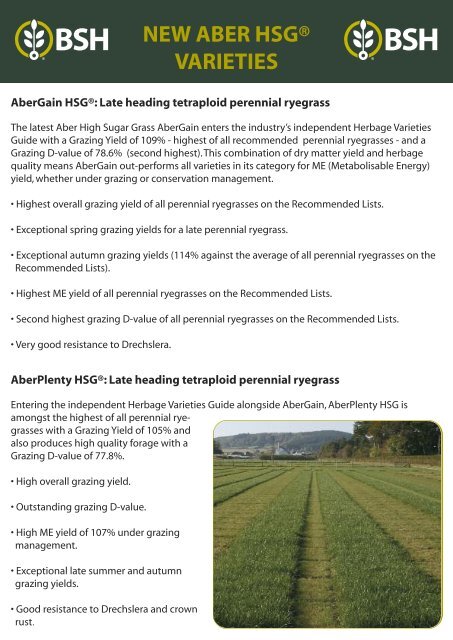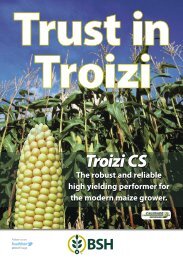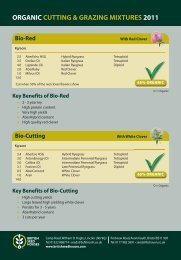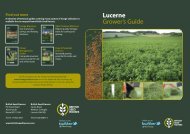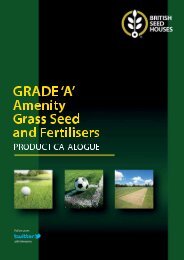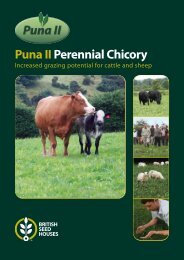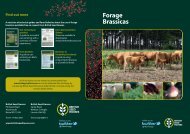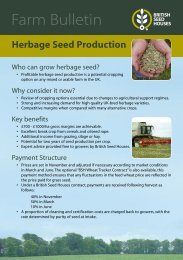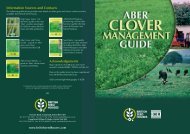AberGain & AberPlenty - British Seed Houses
AberGain & AberPlenty - British Seed Houses
AberGain & AberPlenty - British Seed Houses
You also want an ePaper? Increase the reach of your titles
YUMPU automatically turns print PDFs into web optimized ePapers that Google loves.
NEW ABER HSG®<br />
VARIETIES<br />
<strong>AberGain</strong> HSG®: Late heading tetraploid perennial ryegrass<br />
The latest Aber High Sugar Grass <strong>AberGain</strong> enters the industry’s independent Herbage Varieties<br />
Guide with a Grazing Yield of 109% - highest of all recommended perennial ryegrasses - and a<br />
Grazing D-value of 78.6% (second highest). This combination of dry matter yield and herbage<br />
quality means <strong>AberGain</strong> out-performs all varieties in its category for ME (Metabolisable Energy)<br />
yield, whether under grazing or conservation management.<br />
• Highest overall grazing yield of all perennial ryegrasses on the Recommended Lists.<br />
• Exceptional spring grazing yields for a late perennial ryegrass.<br />
• Exceptional autumn grazing yields (114% against the average of all perennial ryegrasses on the<br />
Recommended Lists).<br />
• Highest ME yield of all perennial ryegrasses on the Recommended Lists.<br />
• Second highest grazing D-value of all perennial ryegrasses on the Recommended Lists.<br />
• Very good resistance to Drechslera.<br />
<strong>AberPlenty</strong> HSG®: Late heading tetraploid perennial ryegrass<br />
Entering the independent Herbage Varieties Guide alongside <strong>AberGain</strong>, <strong>AberPlenty</strong> HSG is<br />
amongst the highest of all perennial ryegrasses<br />
with a Grazing Yield of 105% and<br />
also produces high quality forage with a<br />
Grazing D-value of 77.8%.<br />
• High overall grazing yield.<br />
• Outstanding grazing D-value.<br />
• High ME yield of 107% under grazing<br />
management.<br />
• Exceptional late summer and autumn<br />
grazing yields.<br />
• Good resistance to Drechslera and crown<br />
rust.
The Science Behind High Sugar Grasses<br />
Cattle and sheep are actually poor converters of grass protein into milk and meat. When<br />
grazing ordinary grass, livestock use only about 20% of protein from the herbage for production<br />
- most of the rest is wasted in faeces and urine. This is not only financially costly,<br />
but also detrimental to the environment.<br />
A major reason for these losses is the imbalance between readily available energy and protein<br />
within the grass. Proteins are rapidly broken down when feed enters the rumen. However,<br />
when the diet lacks readily available energy, the rumen microbes can use less of the<br />
nitrogen released from the feed, so much of it is absorbed as ammonia and eventually excreted.<br />
Grass cell walls consist of the complex carbohydrates, cellulose, hemicellulose and lignin.<br />
Although these components can be broken down, this takes time and the carbohydrates<br />
are not, therefore, available early on, when grass protein is broken down in the rumen.<br />
Readily available energy<br />
Water soluble carbohydrates in grass are the sugars found inside the plant cells, rather than<br />
in the cell walls themselves. They become a source of readily available energy soon after<br />
forage enters the rumen, allowing rumen microbes to process more grass protein. This protein<br />
can then be used in the production of meat and milk.<br />
Through this mechanism, Aber HSG varieties, with high levels of water soluble carbohydrates,<br />
can significantly improve the utilisation of protein in grass.<br />
Research at IBERS has shown that Aber HSG varieties have consistently higher levels of<br />
sugars than standard varieties<br />
throughout the grazing season.<br />
Water soluble carbohydrate levels up<br />
to 50% higher have been recorded in<br />
some Aber HSGs. However, studies<br />
have shown even a small difference<br />
in the level of water soluble carbohydrates<br />
can have a big effect on ruminant<br />
performance.<br />
Several trials involving dairy and beef<br />
cattle, as well as sheep, have demonstrated<br />
significant performance benefit<br />
from feeding Aber HSG varieties.<br />
Aber® is a Registered Trademark of Germinal Holdings Limited


